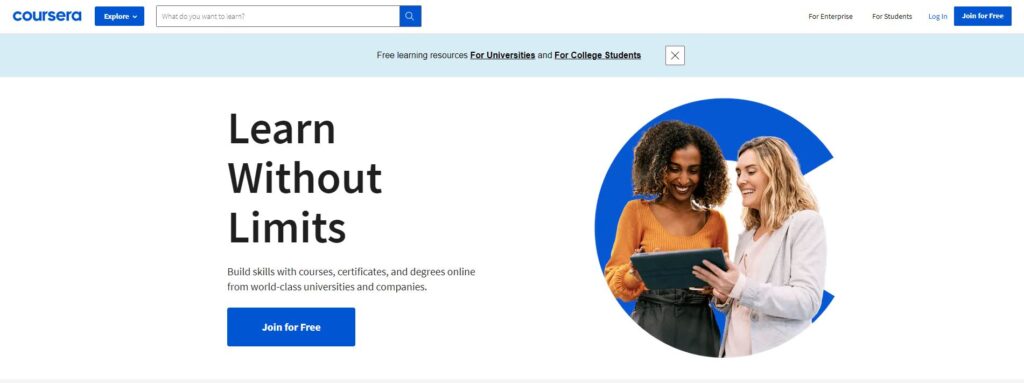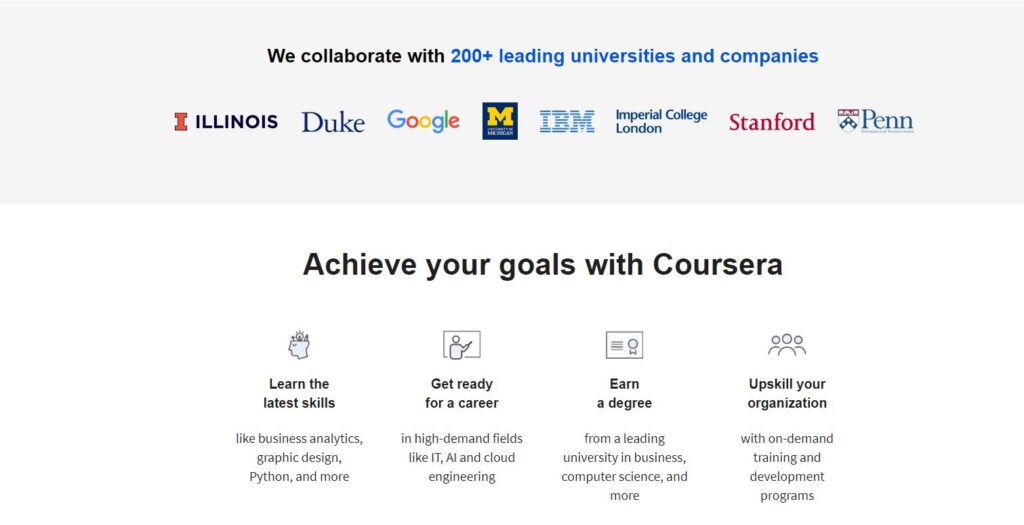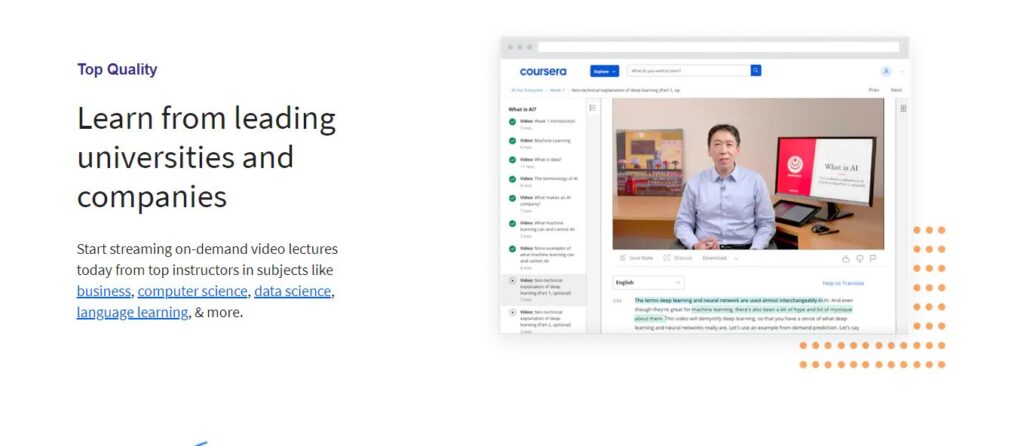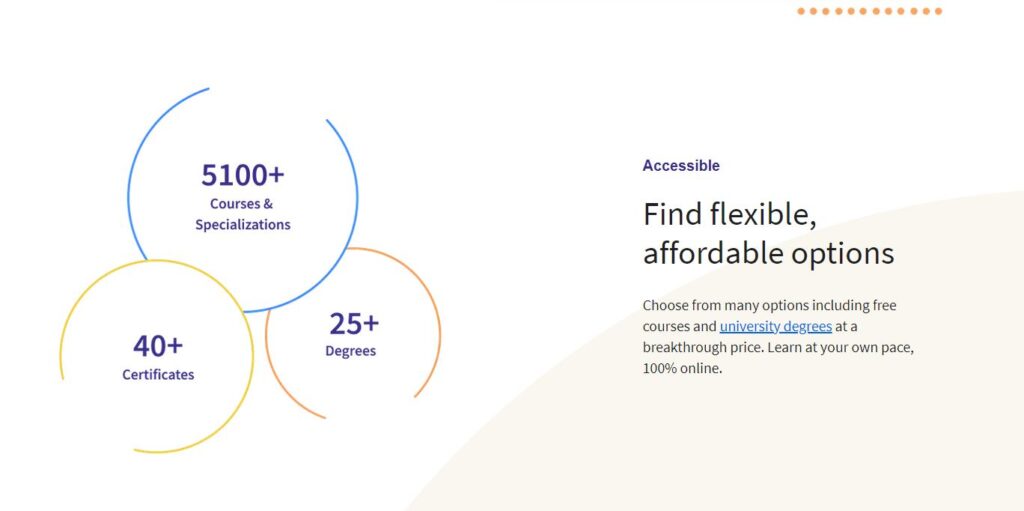Coursera as a platform is growing exponentially. In just two years, the number of registered learners on Coursera has grown by more than 56%. It is the learning platform of choice for nearly 50 million students. It’s also the online education platform of choice for large corporations such as Adobe and MasterCard when it comes to workforce training. At first glance, Coursera seems like the perfect platform for learning any topic online. To see whether that’s really the case, I will have a deeper look into the platform in this review of Coursera.
First of all, I’ll tell you what is Coursera and what are the things that it does. It will probably be rather beneficial to learn about the platform before starting to actually analyze it. After that, we’ll take a look at the company’s business model, provided learning experience, features, pricing, and everything in between.
Let’s not waste any more time and dive right on into the review.
Table of Contents
Coursera Review: Introduction
Launched all the way back in 2012 by two Standford University computer science professors, Coursera is an online education and learning-based platform. It allows students to enroll in courses, specialize in a field of their choice and study the subjects that will help them on their career paths.

Coursera is one of the world’s leading online education websites. Massive open online courses (MOOCs), professional certificates, micro-credential programs, and online degrees are Coursera’s primary line of business. Coursera was one of the first companies in the MOOC industry to achieve the so-called “unicorn” status with its more than $1 billion valuation. It’s easily one of the best MOOC websites for students who want to reap the benefits of studying online, without sacrificing university-level quality. In this Coursera review, you will find out why exactly that is.
To give you a quick overview of the platform, here are some recent key numbers of Coursera:
- 47+ million registered learners
- 3900+ online courses
- 1000+ Specializations
- 15 Professional Certificate programs
- 8 MasterTrack micro-credential programs
- 14 online master’s degrees
- 2 online bachelor’s degrees
- 1900+ enterprise customers, including Adobe and the Abu Dhabi School of Government
It is worth mentioning now, however, that one of these features is a certificate of completion – an official document stating that you have successfully finished and graduated from the course/specialty. A lot of people seem to wonder is Coursera certificate worth it – that is also something that we’ll try to answer.
History of Coursera
Coursera was founded in 2012 by two computer science professors from Stanford University – Andrew Ng and Daphne Koller. However, Andrew Ng started playing around with online learning software much earlier than that. In 2008, he developed the Stanford Engineering Everywhere (SEE) program, which delivered three Stanford courses on machine learning, databases, and AI to online students for free. Each of these three online courses gathered signups of 100,000 students or more, as detailed by Andrew himself in his blog. Seeing such demand for online classes sparked Andrew’s enthusiasm even more, and before long, he started actively developing Coursera together with co-founder Daphne Koller.
Going back in time to 2012, take a look at this interview with Daphne Koller, co-creator of Coursera. At the time when she was giving this talk, Coursera only had 43 online courses available. In less than 8 years, that number has grown nearly a hundred-fold to 4000.
Ease of Use
A good and reputable learning platform should possess, among other things, an “easy-to-use and navigate” type of interface.
The website itself should be easily understandable – a lot of companies aim for flashy designs that do nothing else but confuse the visitors and make them want to leave immediately. Let’s check out just how well Coursera deals with this topic.
Once you enter the main landing (front) page of the website, you are immediately presented with a simple, yet effective greeting. It’s a basic definitive catchphrase – “100% online learning from world’s best universities and companies”.

As simple as it may be, this first one-liner serves its purpose greatly – you immediately get information about what is Coursera, how it’s different from the competitors, what’s the learning model, etc. So far, so good!
The landing page itself is super-simple in terms of design and what is revealed to the visitor. All that is revealed is the above-mentioned catchphrase, a list of partners and a “how it works” section.
Sure, you’ve got your search bar, headers & footers and all of that good stuff, but they’re obligatory either way, so it probably isn’t really worth mentioning.
The interface itself works fine – you can either pick what you want to learn from a drop-down menu or enter the keywords into the search bar. You can pick the topics, primary and subtitle languages, types and so on.
Some users point out in their Coursera reviews that the course/specialization pages are pretty unique in their style and appearance – and I would tend to agree! I don’t want to sound repetitive, but they’re really simple – aesthetically pleasing, minimalistic color pattern, general explanations and “why take this course?” sections, instructor, university and partner introductions, FAQs and that’s it!
Content Quality
Arguably the most important aspect when it comes to online learning platforms, the quality of the content dictates both the platform’s reputation and its overall success. That is why, in this Coursera review, content quality is taken very seriously. So, is Coursera worth it when it comes to the content? To give you a short answer – a definite YES.
In order to expand on that, however, we would have to take a closer look at the content itself – or, rather, the content providers. You see, Coursera works with multiple different universities worldwide – these universities (or, rather, their professors) are the ones that provide the majority of the content to the platform.
It would be tough to argue with the quality of the content when it’s produced by certified professionals of the topic, some of who have spent their entire lives studying and researching the field. Most of the online Coursera reviews tend to agree – people seem to be very happy and satisfied with the quality of learning that they receive.

The only thing that some students point out is that a few professors tend to be very camera-shy, which is somewhat distracting when you’re trying to learn a difficult subject. I’ll let you be the judge whether this critique is objective or not.
Features
A good online learning platform should possess something unique that makes it stand out from the crowd. Take a look at Skillshare, for example – they guarantee that, with every course that you take, you will have the opportunity to work on a project of your own as you learn the subject material.
That’s a great example of a cool idea that is both useful and good for the business side of things.
In this Coursera review, I have to admit that the site does indeed offer some very unique features. First of all, let’s talk about learning choices.
If you want to start learning a subject over at Coursera, you have a few different choices of how to do this. The choices are as follows: audits, certified courses, specializations and degrees.
- Audit. If you want to take a course and learn the material that it provides, but don’t want to spend money to do so (or perhaps the course is simply too expensive), you can choose to audit it. When you audit a course, you are able to view the subject materials and study them, free of charge. You cannot, however, apply for a certificate, submit homework for grading, participate in closed, course-specific activities and so on.
- Certified course. This is the basic option that you can choose to learn over at Coursera. You pay a fee, enroll in the course and simply start learning. Depending on your schedule, you can choose to submit homework assignments and take the tests/exams whenever you are able to. Once you finish this type of course (graduate from it successfully), you will receive a certificate of completion, signifying your achievement.
- Specialization. A specialization is basically a select number of courses pact into one, specific topic. For example, if you want to learn about creative writing, you can choose to either take a standalone course or specialize in the topic – take a bundle of five courses that all revolve on the topic of creative writing, yet cover the different subject matter. Specializations have their own special certificates of completion that you receive after finishing and successfully graduating.
- Degree. A degree is a huge deal – same as in any of the real universities worldwide. If you choose to take a degree, you could say that you basically sign up to go to a university, just online. Coursera offers a wide variety of different degrees that you can take, most of them revolving around business and IT categories.
Furthermore, Coursera offers students a financial aid option. If you want to take a course, but don’t have the funds to do so, you can apply to the company by submitting a special form – if they deem that you are worthy of financial aid, they will compensate the course for you. How cool is that?
Most of the Coursera reviews found online seem to be very positive when it comes to the different types of learning options that the platform offers. The only complaints that I’ve seen are basically aimed at the prices of some specific courses – let’s take a look.
Price
Pricing is an important aspect for any and all online education platforms – it is also the most common point of frustration for the students. You can take any MOOC platform and simply check its reviews out – in one way or another, the most common type of complaint is most probably going to be related to the price.
While writing this Coursera review, I found that the Coursera has two ways of pricing their courses – single, one-off payments and subscriptions.

Single payments for courses range at around the $50 USD mark. Depending on the topic, length and complexity of the course, it can be both less and more than that. Specializations cost around a couple of hundred of dollars – again, it is very variable-dependant.
Furthermore, if you want to get a degree, the prices could go into the thousands – same as with many of the universities in the real world. A subscription, however, costs anywhere from $40 USD all the way to $80-$90 USD per month.
As you can probably see for yourself, the prices definitely aren’t on the cheap side of things. Many Coursera reviews point out that a lot of the courses that used to be free-to-learn have recently become paid ones. One glance at the online Coursera reviews will show you that people are genuinely upset over the price tags that the platform offers.
How Much Does Coursera Cost?
Coursera’s cost depends on the type of online class. Individual Coursera courses cost $29 to $99, but in most cases, they can be audited for free. Coursera’s specialization programs are based on monthly payments of $39 to $89 per month. The Coursera MasterTrack certificate programs cost beginning from $2000. Coursera’s online degrees, however, can cost anywhere from $15000 to $42000.
Coursera Plus is Coursera’s yearly subscription service through which learners can access all 3000+ Coursera courses, specializations and professional certificates with unlimited access. The plan offers excellent value for student such who take online courses frequently.
Is Coursera worth It?
Yes, Coursera is legit and worth the cost. Coursera is one of the most cost-effective MOOC sites currently out there. Thousands of university-backed online courses make it highly appealing for MOOCs, and the new subscription-based Coursera Plus offers excellent value for frequent online students.
Coursera courses for free
Another important distinction of Coursera is that most of their online courses are absolutely free to audit. This means that you can access all of the video materials and reading materials for free. This is a fantastic opportunity for students who are on a tight budget and can’t afford to spend hundreds of dollars on courses they are interested in.
However, as mentioned before, there are some downsides to the free auditing of courses:
- No certification. Coursera’s free courses don’t give certificates. Therefore, if your end goal is to land a job with your newly gathered skills and knowledge, you might want to consider paying for the course so that you can put a Coursera certificate onto your resume.
- No homework grading. Coursera’s free courses don’t include any kind of instructor grading or peer-to-peer grading options. This can become troublesome as you aren’t really getting any kind of professional feedback to your progress during studies unless you pay for the course.
- No quizzes. Even though many modern educators consider quizzes to be old-fashioned methods of student evaluation, they still have a soft spot in my heart. Well-built quizzes are some of my favorite tools for knowledge testing, and a total lack of quizzes in audited Coursera courses makes me prefer to pay for them.
- No college credit. In most cases, Coursera’s free courses don’t give any credit towards a college degree. As I’m not from the United States myself, I have little opportunities to use Coursera’s college credit in any case. However, I know many students love the opportunity to get college credit for taking online courses so I felt like it was worth a mention.
Depending on the course, there might be some additional features missing from the free audit version. Overall, though, despite all these penalties for choosing to audit a course instead of paying for it, I think auditing courses on Coursera is still a spectacular opportunity for learning new skills for free. I know people who have started careers in completely new fields as a result of taking a few online classes on Coursera. And, they didn’t pay a single cent for those courses. Not a bad deal at all, if you ask me.
Learning Experience
Finally, as a final point in this Coursera review, let’s cover the learning experience aspect of the platform. This basically includes the general feeling that a student would get while taking a course and learning over at Coursera.
When people wonder “is Coursera worth it?”, or “is a Coursera certificate worth it?”, most of the time it all falls down to the actual learning experience. And, luckily, Coursera has that covered.
As I’ve mentioned a bit earlier, Coursera does provide a professional learning experience to students, whatever their course of choice would happen to be. The “instructors” (professors) are masters of their craft – this guarantees the quality of the knowledge that you’ll receive.

The timetables are flexible, too – you can choose to work and study at your own pace, try to find a good balance between learning the material and your full-time job. Many online Coursera reviews point out that the platform is great for “people who want to learn their whole life”. I think that’s a pretty good definition.
The certificates that the company offers are a great way to both incentivize and motivate the students not to let go of their goals and finish their studies. People often wonder is the Coursera certificate worth it – and it depends! You can attach it to your LinkedIn profile, so it’s a great bonus to your profile when it comes to potential future employment.
Conclusions
I hope that this Coursera review was useful to you and that you now have a better understanding of the platform and all of its features. If the price isn’t an issue, and if you’ve already got some of the basics down, then Coursera might be a great match for you! Good luck with your online learning experiences to come!
